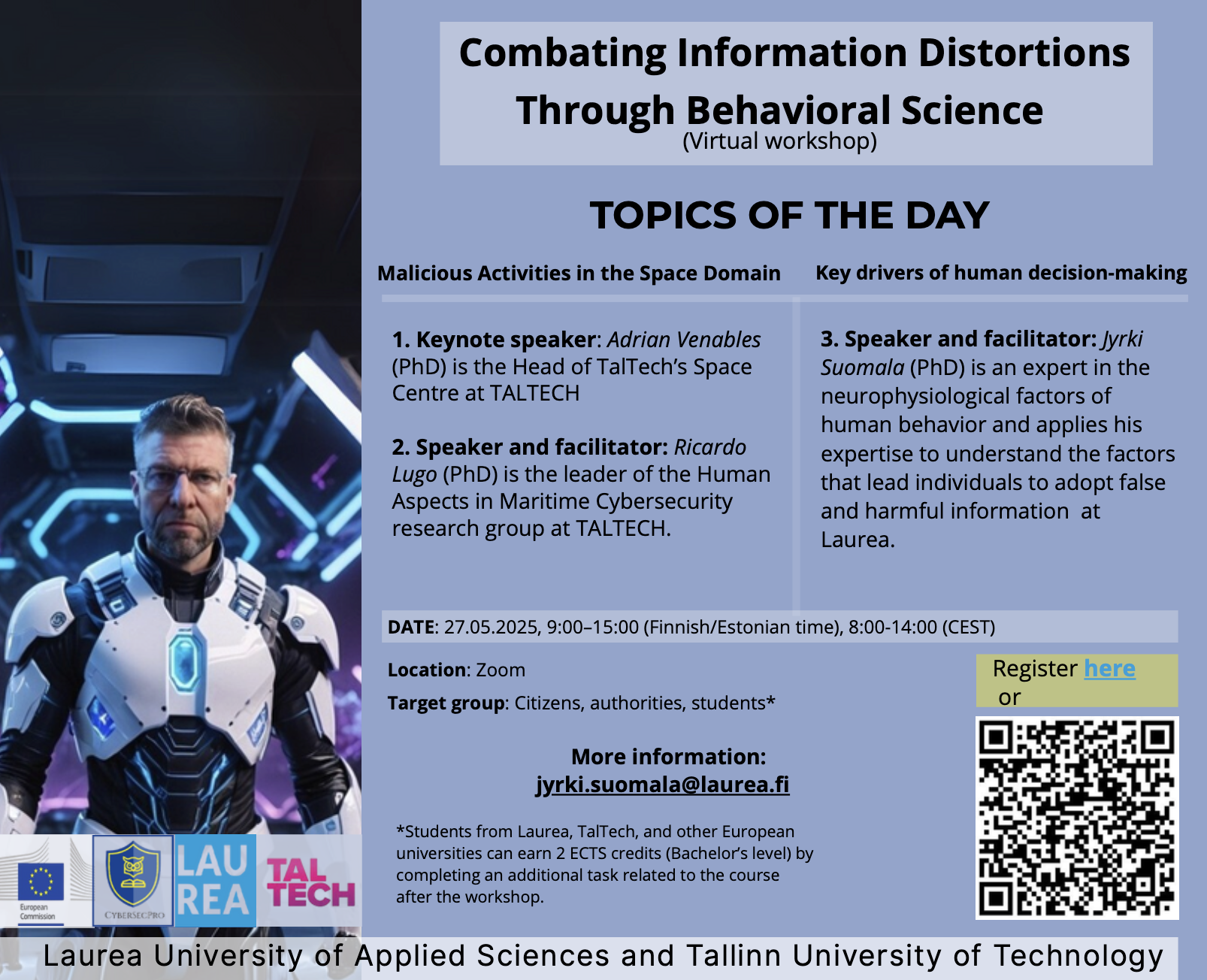
This workshop will examine how psychological safety and information disorder intersect, using behavioral science and psychology as the lens. In an era where misinformation, disinformation, and psychological manipulation spread rapidly—especially through the Internet and AI—Western democracies face growing challenges to public trust in democratic institutions, as highlighted by the World Economic Forum. The workshop will focus on how people process information in environments flooded with digital and other media. A key driver in this process is the principle of personal meaningfulness, which influences decision-making when navigating vast amounts of information.
Participants will explore seven key decision activators—Me, We, Emotion, Knowledge, Goals, Senses, and Differentiation—and learn how personal agency and group affiliations impact decisions. When these activators are threatened, psychological insecurity can increase, making individuals more vulnerable to misinformation.
Using a behavioral science and psychology framework, this session will provide actionable insights on enhancing
This workshop will examine how psychological safety and information disorder intersect, using behavioral science and psychology as the lens. In an era where misinformation, disinformation, and psychological manipulation spread rapidly—especially through the Internet and AI—Western democracies face growing challenges to public trust in democratic institutions, as highlighted by the World Economic Forum. The workshop will focus on how people process information in environments flooded with digital and other media. A key driver in this process is the principle of personal meaningfulness, which influences decision-making when navigating vast amounts of information. Participants will explore seven key decision activators—Me, We, Emotion, Knowledge, Goals, Senses, and Differentiation—and learn how personal agency and group affiliations impact decisions. When these activators are threatened, psychological insecurity can increase, making individuals more vulnerable to misinformation. Using a behavioral science and psychology framework, this session will provide actionable insights on enhancing psychological safety and strengthening resilience against information disorder in today’s complex media landscape.
This lecture will explore the psychological mechanisms behind misinformation, disinformation, and deepfakes, examining their impact on cybersecurity, decision-making, and public trust. Participants will learn how cognitive biases, social influence, and perception shape vulnerability to deception and develop strategies for detection and resistance.
- Διδάσκων: Ric Lugo
- Διδάσκων: Ric Lugo

A Serious Game on Social Engineering
This module provides a comprehensive understanding of the critical role of communication in cyber incident response within high-stakes environments, especially in sectors requiring rapid, coordinated action like maritime operations and cybersecurity defense. Students will explore how human factors, shared situational awareness (SA), and mental models impact decision-making and coordination in cyber defense scenarios. The module addresses the development of effective communication strategies, the unique challenges posed by complex cyber-physical environments, and the integration of human insights into incident response. Practical sessions on situational reports (SITREPS), structured team communication, and crisis communication are included to equip students with tools for enhancing resilience in cyber operations
- Διδάσκων: Ric Lugo
This module provides a comprehensive understanding of the critical role of communication in cyber incident response within high-stakes environments, especially in sectors requiring rapid, coordinated action like maritime operations and cybersecurity defense. Students will explore how human factors, shared situational awareness (SA), and mental models impact decision-making and coordination in cyber defense scenarios. The module addresses the development of effective communication strategies, the unique challenges posed by complex cyber-physical environments, and the integration of human insights into incident response. Practical sessions on situational reports (SITREPS), structured team communication, and crisis communication are included to equip students with tools for enhancing resilience in cyber operations.
Learning Outcomes
By the end of this module, students will be able to:
- Understand the Role of Communication in Cybersecurity: Explain the importance of communication for effective decision-making and coordination during cyber incidents.
- Identify and Apply Communication Strategies: Utilize structured communication methods and situational awareness to enhance team performance and response effectiveness.
- Analyze Situational Awareness and Shared Mental Models: Recognize and implement situational awareness principles and shared mental modeling to improve incident response outcomes.
- Design and Evaluate Crisis Communication Plans: Develop crisis communication strategies that enhance resilience, trust, and efficiency within cyber incident response teams.
- Διδάσκων: Ric Lugo
- Διδάσκων: Stylianos Karagiannis
- Διδάσκων: Kitty Kioskli
- Διδάσκων: Ricardo Lugo
This module, Human Factors in Cybersecurity, delves into the role of human behavior, psychological principles, and decision-making vulnerabilities as pivotal elements in cybersecurity. Students will explore various forms of social engineering and its techniques, analyzing how attackers exploit human psychology to bypass technological defenses. Through real-world case studies and practical examples, the module covers risks, impacts, and countermeasures for social engineering in critical sectors such as energy, maritime, and healthcare. Students will gain insight into the manipulation techniques used in phishing, deepfakes, and dark patterns, equipping them with strategies to recognize, evaluate, and respond to social engineering threats.
Learning Outcomes
By the end of this module, students will be able to:
- Understand the Role of Human Factors in Cybersecurity: Describe the importance of human behavior and psychology in the context of cybersecurity vulnerabilities.
- Identify and Analyze Cybersecurity Risks: Recognize specific cybersecurity risks and vulnerabilities stemming from human factors, with a focus on social engineering tactics.
- Comprehend Social Engineering Processes: Understand how social engineering exploits are conducted and their psychological underpinnings.
- Assess Personal and Organizational Vulnerabilities: Identify one’s own and an organization's susceptibility to social engineering attacks, implementing mitigation strategies to reduce these risks.
- Διδάσκων: Ric Lugo